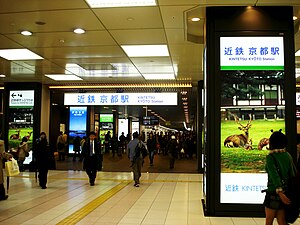Kyōto Station
|
Kyoto Station
京都駅 |
|
|---|---|

Kyoto Station Building (Karasuma side)
|
|
| Location |
Shimogyo-ku, Kyoto, Kyoto Prefecture (京都市下京区) Japan |
| Operated by | JR-West, JR Central, Kintetsu, Kyoto Municipal Subway |
| Connections |
|
| Traffic | |
| Passengers (2014) | 247 million |
| Location | |
|
Kyoto Station
京都駅 |
|
|---|---|
| JR station | |

Hachijō-side building of Kyoto station
|
|
| Location | 901 Higashi-Shiokōjichō (JR West) 8-3 Higashi-Shiokōji Takakura-chō (JR Central) Shimogyō-ku, Kyoto, Kyoto Prefecture (京都市下京区東塩小路町901(JR西日本) 京都市下京区東塩小路高倉町8-3(JR東海)) Japan |
| Coordinates | 34°59′7.65″N 135°45′27.92″E / 34.9854583°N 135.7577556°E |
| Operated by | |
| Line(s) |
|
| History | |
| Opened | 1877 |
| Traffic | |
| Passengers (2015) | 146 million |
|
Kyoto Station
京都駅 |
|
|---|---|
| Kintetsu station | |
 |
|
| Location | 31-1 Higashi-Shiokoji Kamadonochō, Shimogyō-ku, Kyoto, Kyoto Prefecture (京都市下京区東塩小路釜殿町31-1) Japan |
| Coordinates | 34°59′4.82″N 135°45′27.05″E / 34.9846722°N 135.7575139°E |
| Operated by | Kintetsu Railway |
| Line(s) | Kintetsu Kyoto Line |
| History | |
| Opened | 1928 |
| Traffic | |
| Passengers (2014) | 37 million |
|
Kyoto Station
京都駅 |
|
|---|---|
| Kyoto Municipal Subway station | |

Kyoto Subway Station Exit No.1
|
|
| Location | Higashi-Shiokōji, Shimogyō-ku, Kyoto, Kyoto Prefecture (京都市下京区東塩小路) Japan |
| Coordinates | 34°59′7.97″N 135°45′36.44″E / 34.9855472°N 135.7601222°E |
| Operated by | Kyoto Municipal Subway |
| Line(s) | Karasuma Line |
| Other information | |
| Station code | K11 |
| History | |
| Opened | 1981 |
| Traffic | |
| Passengers (2015) | 44 million |
Kyoto Station (京都駅 Kyōto-eki?) is a major railway station and transportation hub in Kyoto, Japan. It has Japan's second-largest station building (after Nagoya Station) and is one of the country's largest buildings, incorporating a shopping mall, hotel, movie theater, Isetan department store, and several local government facilities under one 15-story roof. It also housed the Kyoto City Air Terminal until August 31, 2002.
Kyoto Station is served by the following railway lines:
In addition to the lines above, the following lines, among others, have through services to Kyoto Station:
The station has a side platform and four island platforms serving eight tracks for the Tokaido Line (Biwako Line, JR Kyoto Line) and Kosei Line at ground level, three dead-end platforms serving four tracks for the Sanin Line (Sagano Line) to the west of platform 0 at ground level, and two dead-end platforms serving 3 tracks to the south of platform 7 at ground level. Two island platforms serving four tracks for the Shinkansen are elevated, above the platforms for the Kintetsu Kyoto Line.
The station has three levels. Four dead-end platforms serving four tracks are located on the second floor. The 1st floor is a shopping street and the 3rd is the platforms for the Shinkansen (JR Central).
The station consists of one underground island platform serving two tracks.
The governmental railway from Kobe reached Kyoto on September 5, 1876, but the station was under construction and a temporary facility called Ōmiya-dōri (Ōmiya Street) Temporary Station was used until the opening of the main station. The first Kyoto Station opened for service by decree of Emperor Meiji on February 5, 1877.
In 1889, the railway became a part of the trunk line to Tokyo (Tokaido Main Line). Subsequently, the station became the terminal of two private railways, Nara Railway (1895, present-day Nara Line) and Kyoto Railway (1897, present-day Sagano Line), that connected the station with southern and northern regions of Kyoto Prefecture, respectively.
...
Wikipedia

